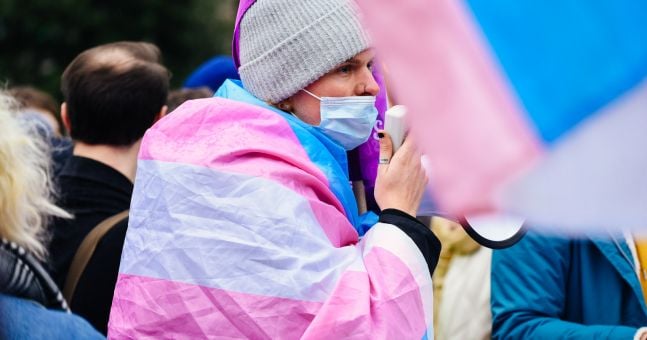A 2022 study by the Canadian Centre for Ethics in Sport (CCES) found that transgender women athletes have no advantages over their cisgender peers.
Transgender Women Athletes and Elite Sport: A Scientific Review was published in late 2022. The Canadian Centre for Ethics in Sport (CCES) is a non-profit advocating for fairness, safety, accessibility, and inclusivity in sports.
The study spanned between the years 2011 and 2021, using compiled research to observe and report upon key biomedical findings and sociocultural findings. It was commissioned by the CCES to evaluate the differences in performance between trans women and cisgender women athletes.
New Literature Review Does Not Support Bans on Transgender Women Athletes
Authors of “Transgender Women Athletes and Elite Sport: A Scientific Review” call for reasonable efforts to make sport accessible and inclusive
MEDIA RELEASE: https://t.co/pvMqk5vwcJ@WomenandSportCA pic.twitter.com/93dK5OIPh9
— CCES (@EthicsInSPORT) November 3, 2022
The biomedical findings focused on the impacts of testosterone on athletes and the impact of testosterone suppression.
Many porting leagues’ policies regarding trans athletes cite male puberty as a reason trans women have advantages over their cisgender peers. However, the review noted that there is “no firm basis” indicative of trans women having “consistent and measurable overall performance benefit after 12 months of testosterone suppression.”
The report continued on, warning that policies made to limit unfair advantages trans athletes are suspected to have should be developed carefully. The policies should consider the lack of trans athletes, which is a product of their complete absence or of industry exclusion.
“Additionally, these individuals should not be excluded during any non-competition periods from participating with a team through training, exhibition matches or social activities.”
The socio-cultural aspects examined the history of gender categories in sports, perpetual trans sport myths, and discrimination and violence against trans women.
“The living conditions of trans women are the result of downward mobility and the many cissexist discrimination they experience.”
“Surveys on the living conditions of trans women in Canada show a strong limitation in access to vital spaces (housing, health care work, public space including sports facilities, etc.) meaning that they can be subjected to violence in every aspect of their lives.
The report also explored historical instances of women’s sport being regulated as “inferior,” using any negligible biological differences to keep women out of large-scale sport operations, like the Olympics.
“Since 1966 we have witnessed different waves of femininity tests implemented by sports organisations. Anatomical at first, then genetics, and now hormonal. All tests were inconclusive because contrary to the medical assumption that led to these tests, men and women are not dimorphic and show overlap in all those areas.”
Addressing the myth that trans women are equivalent to cisgender men, the report claims that trans women are over sensationalised.
“No trans woman has ever won an Olympic medal ever since they have been allowed to compete in 2004.”
Ultimately, the research concludes that trans women have been excluded from and discriminated against based on unfounded myth, false research, and transphobic policies.
“There is strong evidence that elite sport policy is made within transmisogynist, misogynoir, racist, geopolitical cultural norms.”
Informed discussions on Trans & Non-Binary Inclusion is critical if we are to create a safe space for all national team athletes to reach their full potential on and off the field
Join the Board (Deadline today!)➡️https://t.co/TMyw8eSKV4
Register for AGM➡️https://t.co/3l747mPKs5 pic.twitter.com/BRyYlK1QhB— AthletesCAN (@AthletesCAN) October 28, 2022
The International Olympic Committee (IOC) updated their policies on trans athletes back in 2021, releasing IOC Framework of Fairness, Inclusion and Non-Discrimination on the Basis of Gender Identity and Sex Variations.
Like the CCES’s report, the IOC asks that the International Federation (IF) considers the importance of inclusion when developing policy and that the eligibility criteria should “be reserved for elite competition only, with inclusion prioritised for youth and community sport.”
“The design, implementation and evaluation of these measures and mechanisms should be done in consultation with a cross-section of affected athletes.”
Even months after the report’s publishing, the remains little acknowledgement of it.
In August, the IRFU decided to ban transgender women from contact rugby. According to GCN, there were only two trans women registered in female contact rugby in Ireland. The Scotland Rugby Union (SRU) recently enacted a similar policy, active since February 1st.
The IRFU determined that trans men would continue to be allowed to play in men’s rugby if they supplied written consent.
In November 2022, Ireland was ranked the worst country in the EU for transgender healthcare.
The transgender community remains a threatened minority. Just this month, transgender teenager Brianna Ghey was murdered in the UK. A vigil for her was held in Dublin, as well as across the UK and Ireland, in her memory.
Discrimination against transgender people remains a prevalent issue as violence against LGBTQ+ people has reached an all-time high. Reportedly a new hate crime legislation is being considered to reduce violence, although it is only a small step forward to improving the situation.



